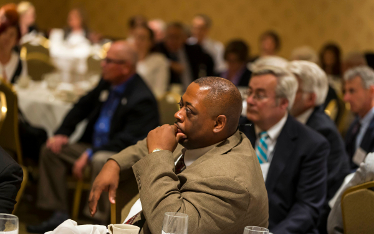
Chad Burton, a lawyer and CEO of CuroLegal, which provides law practice solutions to lawyers and law firms, speaks on the future of the legal profession and the critical role that bar associations play in helping its members.
Sept. 28, 2015 – The State Bar of Wisconsin’s Board of Governors (board) supports a petition to authorize and facilitate the use of electronic appellate records, as well as the continued authority of circuit courts to transfer certain civil actions to tribal court.
At its first meeting of the fiscal year, held in Elkhart Lake Friday, the board heard about its role in preparing for the “future of the profession” and received an orientation before casting votes on two petitions that are pending before the Wisconsin Supreme Court.
Board Supports Tribal Court Transfer Rule
The board voiced unanimous support for continued operation of Wis. Stat. section 801.54 (effective Jan. 1, 2009), which grants circuit courts discretionary authority to transfer civil actions to Indian tribal courts in cases where the circuit and tribal court have concurrent jurisdiction, including transfer of post-judgment child support cases.

Attorney Eric Andrews, board liaison for the Wisconsin Association of African-American Lawyers, listens to presentations at a joint Board of Governors and Bar Leaders lunch.
The Wisconsin Supreme Court (6-1) created section 801.54 under its authority to regulate pleading, practice, and procedure in state courts. The Wisconsin State-Tribal Justice Forum, established to foster communication, education, and cooperation among state and tribal court systems, requested the discretionary tribal court transfer rule.
In July 2014, six members of the Oneida Tribe of Indians of Wisconsin filed a petition (14-02) to repeal the rule. Through broad objections, including issues with tribal leadership, the say the rule is negatively impacting tribal children and families.
However, the State Bar’s Indian Law Section supports the continued existence of section 801.54. In a memo, the section board said tribes and tribal members “value the rule because it facilitates having cases heard in a forum reflecting culturally specific tribal values while applying the law in the context of tribal jurisdiction.”
The section board noted that before the rule was implemented, difficult questions of procedure and jurisdiction arose during parallel litigation in state and tribal courts. The State Bar’s board, which supported the rule in 2008, supports the section’s position.
The supreme court will hold a public hearing on the petition Nov. 10, 2015.

The board approved Renee Nawrocki, Milwaukee, to fill a board vacancy for District II. Nawrocki replaces attorney Jill Kastner, who was appointed board chair.
Board Supports Use of Electronic Appellate Records
The board unanimously supports a petition that would amend Wisconsin’s Rules of Appellate Procedure to authorize and facilitate the use of electronic appellate records. The State Bar’s Appellate Practice Section also supports the petition.
The clerk of the Wisconsin Supreme Court and Court of Appeals filed the petition (15-02) in June 2015. Current rules allow court clerks to store appellate court records electronically, but a paper record must be forwarded to the reviewing court.
Clerks are seeking authority to transmit records electronically, primarily to save preparation time and copy and mailing expenses. Last year, for instance, the court of appeals incurred almost $30,000 in mailing costs related to court record transfers.
A supporting memo notes that if the petition is approved, multiple approved users will have access to the electronic record from anywhere. An index would include links to documents in the record, including exhibits and electronic media, with limitations.
Photographs, video and audio recordings, and other computer media would be included, except documents of physical evidence, models, charts, diagrams, and photographs exceeding 8.5 by 11 inches unless requested by a party.
The supreme court is holding a public hearing on the petition Oct. 13, 2015.
Other Business

Illinois State Bar Association President Umberto Davi and other Illinois bar leaders attend a joint bar leaders lunch with the State Bar of Wisconsin's Board of Governors.
The board sent a succession plan and updated job description for the State Bar’s executive director position back to the board’s Governance Committee for reconsideration. The committee had approved a tentative succession plan, which governs the process of selecting a new executive director if the job becomes vacant.
The board approved State Bar President Ralph Cagle’s appointments to the Nomination Committee for the State Bar’s April 2016 election cycle: State Bar President-elect Fran Deisinger (chair), Milwaukee; Susan Collins, Madison; William Curran, Mauston; Benjamin Lane, Chippewa Falls; and Kevin Palmersheim, Middleton.
The board approved attorney Renee Nawrocki, Milwaukee, to fill a board vacancy for District II. Nawrocki replaces attorney Jill Kastner, who was appointed board chair.
Upon request, interested members may obtain a copy of the minutes of each meeting of the Board of Governors. For more information, contact State Bar Executive Coordinator Jan Marks by email or by phone at (608) 250-6106.
